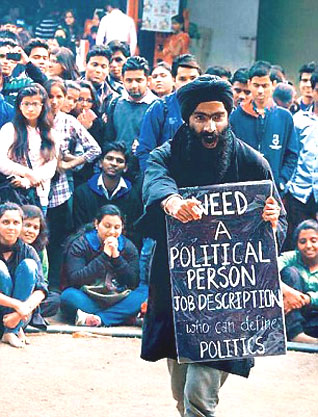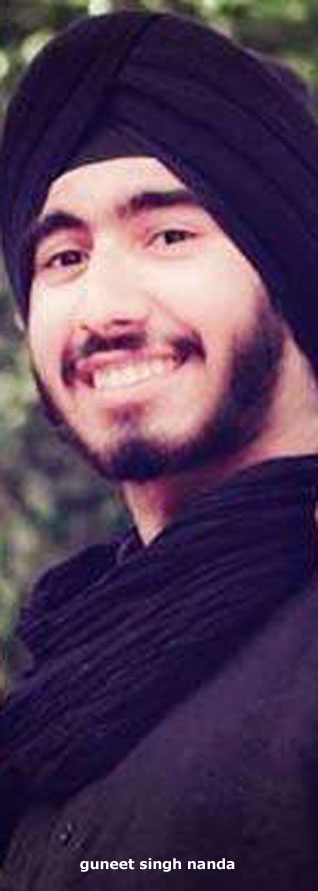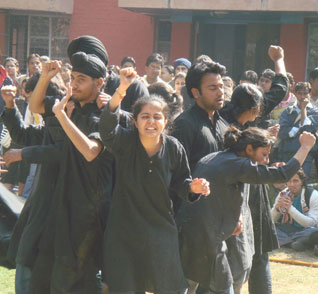Film/Stage
Extremists Want To Ban Street Plays By Delhi University’s Ankur Theatre
HEENA KAUSAR, ASHLIN MATHEW, ADILA MATRA & HANSA MALHOTRA
A right-wing Hindu student group, Akhil Bharatiya Vidyarthi Parishad, having a strangle-hold on the Delhi University Students’ Union (“DUSU“), has locked horns with the Drama Society of The Sri Guru Tegh Bahadar (“SGTB”) Khalsa College by calling for a ban on what they, the Hindu fundamentalists, claim is an 'anti-Hindu' play.
The student union has sought an immediate ban on the “Ankur Society” which has been performing their play, “Welcome to the Machine,“ as street theatre since February this year in various colleges of the university.
“I haven’t seen the play but I received many complaints from students who have seen it. Students told me the play was showing Hinduism in bad light. This drama society is showing inhumanity by presenting fake drama on Hindu and Hinduism. We have asked for banning the group,” DUSU joint secretary Aashutosh Mathur said.
But the drama group has refused to bow down to DUSU’s threat and said they will soon perform the play at the Arts Faculty.
“Our play shows how Hindu religious forces are ascertaining their dominance over others by means of culture, education and institutional structures,” Guneet Singh Nanda, President of the Ankur Society responded.
Guneet condemned DUSU’s move and said such moves are an attack on free speech.
DUSU’s letter was sent to the college on March 17 and was received by the Principal on the next day.
“In this connection, you are requested to take strong action against the ‘Ankur Society‘ of your college and ban it with immediate effect. Kindly take an immediate action otherwise the students union will protest on high level against it,” the letter said.
Khalsa Colege Principal Jaswinder Singh refused to comment on the matter and said a final call on what is to be done regarding DUSU’s letter would be taken after reviewing the matter.
* * * * *
Street plays have come a long way since the days attempts were made to muzzle voices of activism.
It was a pale pink-and-violet sky in Delhi with flashes of orange. Under this expanse, voices of discontent rose at Jantar Mantar with Jana Natya Manch’s new street play, ‘Natak Chhappan Chhati Ka‘, a satirical look at the reality which underpins the ‘achhe din’ (good days) that the current crop of politicians in power claim have arrived.
Even though it has been 25 years since Jana Natya Manch’s founding member Safdar Hashmi was hacked to death during the performance of ‘Halla Bol’ in Ghaziabad, the fire within them still burns bright.
From Hashmi’s savage killing to the recent threats of ban faced by Ankur Theatre Production of Khalsa College for their street play, ‘Welcome to the Machine‘, street theatre in India’s capital has come a long way despite its share of trials and tribulations.
“When the time is right, voices will rise. It is hard to censor street theatre. How do you allow checks on something that is not performed in an auditorium and isn’t ticketed? No one knows when or where it will happen,” says Sudhanva Deshpande, Director of Jana Natya Manch.
Asmita Theatre Group, headed by Arvind Gaur, came into limelight during the anti-corruption movement that rocked the city and the country.
“We did street plays on corruption 10 years ago too, but it never made that huge an impact. However, when it was done as part of the movement, people began to take notice. We were doing almost 40 shows a day around Delhi,” Gaur says.
Street theatre has always been the medium to speak about the wrongs in society.
“The Emergency period (when Indira Gandhi suspended Parliament and assumed dictatorship powers in 1976) was the peak era of street theatre. Though there was a time just after Hashmi’s killing when street theatre took a backseat, many global changes that followed -- globalisation, fall of the Soviet Union -- brought the social art back to the streets of the country. All these are very important for the existence of street theatre,” he says.
“Now, nukkad natak has moved from the topics of capitalist-proletariat clashes to what affects the society now -- like corruption, women rights and so on. The revolutionary flag-bearing stage of street theatre is over. It is time to create conversations,” says Arvind Gaur, who is of the opinion that street theatre is a constructive way of venting your anger towards the system.
“The system has always been against voices of dissent. Habib Tanvir was stoned during a performance and Hashmi was lathicharged far too often. Some of our actors were even jailed when we performed a play on Bhagat Singh,” adds Gaur.
This hasn’t halted political groups from using it to gather audiences during campaigning.
“It was never planned that we will ‘introduce’ street plays in our campaign. When the first voice was raised against corruption at Jantar Mantar, it was not Arvind Kejriwal‘s, mine or any specific person‘s campaign. It was an outburst of anger from all sections of society. As time passed by, the teams became an integral part of all of our activities, and later they also campaigned during Lok Sabha and Delhi Vidhan Sabha elections,” says AAP leader Kumar Vishwas.
But, when political parties like BJP who already have a stronghold in the society use street theatre for campaigning, the social tool loses its charm, switching from a voice of ‘protest’ to that of mere ‘propaganda’.
As Gaur says, “If you’re prompting your audience to think about why voting is important, it’s justified. Imposing your ideas should never be the idea of street theatre.”
Guneet Singh Nanda, President of Ankur, The Dramatics Society of Khalsa College, says it’s pure manipulation.
“They know that street theatre has an audience. It has the power to sensationalize. Political parties just use that to manipulate the voters,” he says. Even though, as the adage goes, all good things must come to an end, the culture of street theatre will live as long as utopia drives us on.
* * * * *
AN INTERVIEW WITH GUNEET SINGH NANDA, BY HANSA MALHOTRA
Question: Is your play about Hindu fundamentalism?
Answer: Its theme is Hindu fundamentalism and religious polarisation through cultural symbols. Recent incidents led to its being written.
Q: Are you intimidated by the threat to ban it?
A: We are shocked. We had been hearing of bans by the government and then suddenly a Delhi University play was being threatened.
Q: It has been termed ‘anti-Hindu'.
A: The man who wrote the letter said he had not seen the play. To anyone who has, it's not ‘anti-Hindu'. It examines how religion is being interpreted by politicians for votes.
Q: Have you made any changes to the script?
A: No.
Q: Are you still performing the play?
A: We have not performed the play after we got the letter to stop it.
Q: Did you foresee such an extreme response?
A: The script is direct and we knew that it could cause discomfort to a few, but we never expected this response.
Q: You have named right-wing leaders and institutions in your play. Was that on purpose?
A: The content is direct; we have not used metaphors. We have named leaders from both the Congress and the BJP. The choice to use actual facts was deliberate.
Q: Does the play have Santa-Banta jokes on Hindu proselytisation?
A: We were researching the 1984 pogroms and we found many Santa-Banta jokes from the names of Indira Gandhi's killers, Satwant and Beant Singh. Thus the idea to use them came about.
Q: Are you taking a jibe at Sadhvi Jyoti by saying, ‘Yeh play haraamzaadon ke liye nahi, raamzaadon ke liye hai'?
A: Yes.
Q: Do you think street theatre is a subversive art form?
A: Street theatre is about telling people that there is something happening around them, to invoke a discussion that could lead to change.
[Courtesy: Daily Mail, India Today. Edited for sikhchic.com]
April 15, 2015
Conversation about this article
1: Kaala Singh (Punjab), April 16, 2015, 12:39 PM.
These guys really enjoy when Sikhs are mocked in Bollywood movies and those nasty jokes on Sikhs are their regular fare, but they can't handle the truth when it comes to them and lose no time in banning anything that exposes reality.
2: Sunny Grewal (Abbotsford, British Columbia, Canada), April 16, 2015, 2:30 PM.
I wonder if gene therapy can cure the condition of being "thin-skinned" for Hindus. It seems to be a genetic condition which is endemic in their community.
3: Sunny Grewal (Abbotsford, British Columbia, Canada), April 16, 2015, 2:34 PM.
Can someone clarify if the Santa-Banta jokes predate Beant Singh and Satwant Singh and the names were appropriated into the joke, or if the jokes take their origin in their names? How much insecurity does an entire community have when it has to use jokes on its neighbors? The 12:00 o'clock jokes are rooted in the fact that the Sikhs would swoop in at night and save Hindu women from becoming Afghan sex slaves because their own men were too inept and weak to do anything. Hindus seem to think that they can remedy the weakness and cowardice of their own men through jokes. They truly are a weird people.
4: Kaala Singh (Punjab), April 16, 2015, 11:21 PM.
@3: These Santa-Banta jokes pre-date Beant Singh and Satwant Singh. Also, these guys may make fun of us but deep inside, they know who they are. There is no nation in the world of this size and population which was enslaved for a thousand years and, in the end, who got them freedom? Yes, it was Hitler and the Japanese who severely weakened the British military power and made it impossible for them to hold on to their overseas colonies, and not anything the Indians did. Right now they have illusions of power that they don't possess, not even through dint of the wealth that a few of them have managed to accumulate. It is amazing to see them going around the world begging for capital and technology when they should have been exporters of the same. Look at neighbouring China and you will know what I mean. And as far as the Sikhs are concerned, they have spread and succeeded all over the world, it is this envy that makes them makes them turn against us.
5: Kamal Kashyap (Haryana, India), December 17, 2015, 1:46 AM.
I urge all to join and support such daring and courageous projects.





